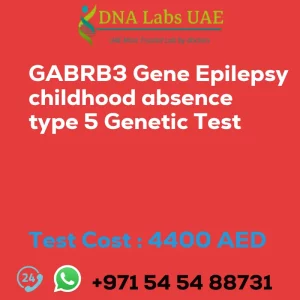CACNA1A Gene Episodic Ataxia Type 2 Genetic Test
At DNA Labs UAE, we offer the CACNA1A Gene Episodic Ataxia Type 2 Genetic Test to help diagnose and manage this rare genetic disorder. This test is specifically designed for individuals who are experiencing symptoms of Episodic Ataxia Type 2 (EA2).
Test Components and Price
The CACNA1A Gene Episodic Ataxia Type 2 Genetic Test is priced at 4400.0 AED. The test requires a blood sample or extracted DNA, or just one drop of blood on an FTA card.
Report Delivery
After the sample is collected, the report will be delivered within 3 to 4 weeks.
Method and Test Type
The CACNA1A Gene Episodic Ataxia Type 2 Genetic Test utilizes NGS (next-generation sequencing) technology. This advanced method allows us to analyze the DNA sequence of the CACNA1A gene and identify any mutations or changes that may be causing the disorder. The test falls under the category of neurological disorders.
Test Department and Doctor
The CACNA1A Gene Episodic Ataxia Type 2 Genetic Test is conducted by our experienced neurologists in the Genetics department.
Pre-Test Information
Prior to the test, it is important to provide the clinical history of the patient who will be undergoing the CACNA1A Gene Episodic Ataxia Type 2 NGS Genetic DNA Test. Additionally, a genetic counseling session will be conducted to draw a pedigree chart of family members affected by this disorder.
Understanding Episodic Ataxia Type 2 (EA2)
Episodic Ataxia Type 2 (EA2) is a rare genetic disorder that affects the nervous system. It is caused by mutations in the CACNA1A gene, which is responsible for producing a protein that regulates the flow of calcium ions into cells. This protein plays a crucial role in the proper functioning of nerve cells in the brain and spinal cord.
The symptoms of EA2 can vary from person to person but commonly include episodes of ataxia (loss of muscle coordination and balance), dizziness, headache, and nausea. These episodes can last anywhere from minutes to days and may be triggered by factors such as stress, exercise, or alcohol consumption.
Why Choose NGS Genetic Testing?
NGS (next-generation sequencing) genetic testing is a highly effective method for identifying mutations in the CACNA1A gene. This advanced technology allows us to analyze the DNA sequence of the gene and detect any changes or mutations that may be causing the disorder.
Benefits of Genetic Testing
If you or a family member has been diagnosed with EA2, genetic testing is highly recommended. It not only helps confirm the diagnosis but also identifies other family members who may be at risk of developing the disorder. This information is crucial for guiding the treatment and management of the condition, as well as making informed family planning decisions.
At DNA Labs UAE, we are committed to providing accurate and reliable genetic testing services. Our CACNA1A Gene Episodic Ataxia Type 2 Genetic Test can help you gain a better understanding of this disorder and take proactive steps towards managing it.
| Test Name | CACNA1A Gene Episodic ataxia type 2 Genetic Test |
|---|---|
| Components | |
| Price | 4400.0 AED |
| Sample Condition | Blood or Extracted DNA or One drop Blood on FTA Card o |
| Report Delivery | 3 to 4 Weeks |
| Method | NGS Technology |
| Test type | Neurological Disorders |
| Doctor | Neurologist |
| Test Department: | Genetics |
| Pre Test Information | Clinical History of Patient who is going for CACNA1A Gene Episodic ataxia type 2 NGS Genetic DNA Test A Genetic Counselling session to draw a pedigree chart of family members affected with CACNA1A Gene Episodic ataxia type 2 |
| Test Details |
Episodic ataxia type 2 (EA2) is a rare genetic disorder that affects the nervous system. It is caused by mutations in the CACNA1A gene, which provides instructions for making a protein that helps regulate the flow of calcium ions into cells. This protein is important for the proper functioning of nerve cells in the brain and spinal cord. The symptoms of EA2 can vary widely from person to person, but typically include episodes of ataxia (loss of muscle coordination and balance), dizziness, headache, and nausea. These episodes can last from minutes to days and may be triggered by stress, exercise, or alcohol consumption. NGS (next-generation sequencing) genetic testing is a powerful tool for identifying mutations in the CACNA1A gene. This type of testing uses advanced sequencing technology to analyze the DNA sequence of the gene and identify any changes or mutations that may be causing the disorder. If you or a family member have been diagnosed with EA2, genetic testing may be recommended to confirm the diagnosis and identify any other family members who may be at risk of developing the disorder. This information can be used to guide treatment and management of the condition, as well as inform family planning decisions. |







